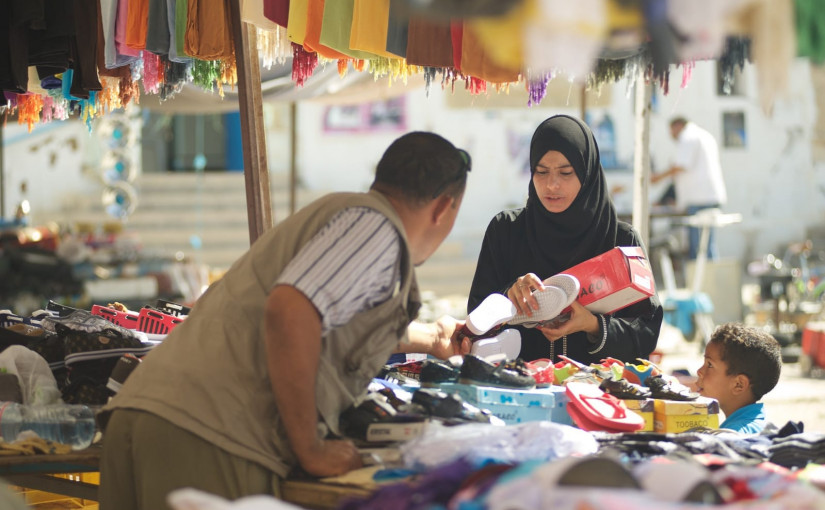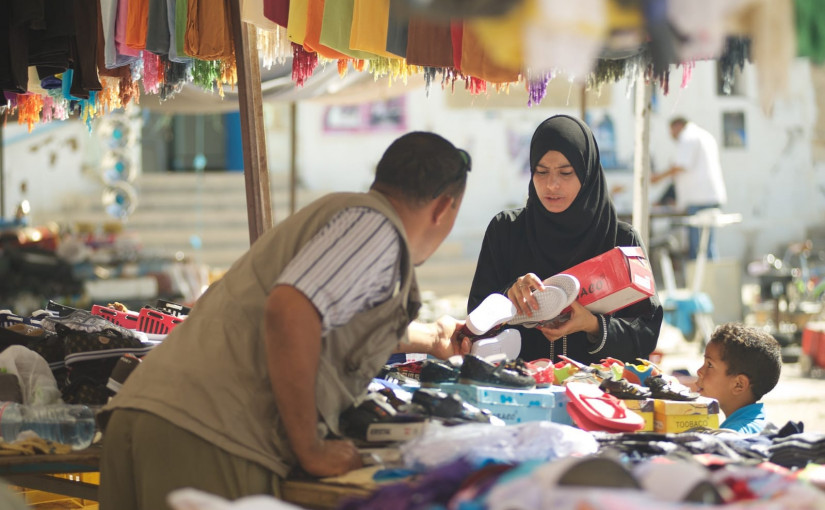Sharia economy becomes a topic in Presidential election debate last April. Aside from the representatives’ answers, to bring the topic is one thing, it marks the sharia economy and its derivatives are already taken place in the country’s economy.
Today, after Joko Widodo and Ma’ruf Amin officially Indonesia’s President and Vice President, sharia economy is emerging. It’s represented by some digital companies which counting their luck in this Islamic-based economy.
First indicator is seen as Tokopedia and Shopee visited the office of Vice President Ma’ruf Amin last November. Tokopedia‘s Chief Commissioner Agus Martowardojo and Vice-Chairman Leontinus Alpha Edison arrived first. After two weeks, Shopee also made a similar move by taking its top officials to meet Ma’ruf as the Chairperson of the Indonesian Ulema Council (MUI) and an important figure in the local Islamic financial industry.
The second visit of the e-commerce giant is said to be a new round of their competition in the Islamic market. Tokopedia with the Tokopedia Salam feature, while Shopee with Shopee Barokah.
Another indicator is the entrance of some conventional investors into sharia-based businesses. It can be traced from the investment of Golden Gate Ventures, Agaeti Ventures, and RHL Ventures to Alami, a local sharia-based fintech company. The emerging new startups that focus on providing sharia products or those expanding its coverage into the sharia market showed a high demand for sharia market in Indonesia, such as Qazwa, Waqara, Investree, LinkAja, and Akulaku.
The keen interest of digital companies to enter the sharia market points out at one thing: a great potential ready to be executed. It is clearly not just pocket-sized money, considering Indonesia as a country with the largest Muslim population in the world.
The State of Global Islamic Economy Report 2019/2020 reported Indonesia’s score at 49, placed at 5th position out of 73 countries. The score was determined from several sectors such as Islamic finance, halal food, Muslim-friendly tourism, fashion, media & recreation, also pharmacy & cosmetics. Halal food and Islamic finance are the two biggest sectors contributing to this assessment.
The report shows Indonesia’s overall sharia market has developed quite significantly, from 10th place last year to the 5th place this year. The biggest factor is said to be the country’s blueprint of Islamic economy development and fresh initiatives such as Halal Park which was launched a few months ago.
Of the six sectors in the report, Indonesia has positioned in the top 10 in 3 sectors, namely 5th in the Islamic financial sector, 4th in Muslim-friendly tourism destinations, and 3rd in the fashion sector. Halal or sharia-based product consumption in Indonesia is the largest in almost every sector, especially for halal food. Indonesia is rated as a country with halal food consumption value at US$ 173 billion (Rp2,400 trillion) or the largest in the entire world.
In terms of Islamic financial institutions, Indonesia is likely to be on the right path. Indonesia’s sharia financial asset is projected at the 7th rank with valuation at US$ 86 billion or Rp1,200 trillion. The number is likely to grow along with the implementation of the Sharia Economic Master Plan 2019-2024.
The Players
Some of Indonesia’s startup players have penetrated the Islamic market and halal products. Primarily, they are categorized in two; those providing Muslims products since the beginning and those who expand their services.
However, the number appeared to be not big enough. Some of the players are Ammana, Alami, Syariah Funds, Qazwa, Duha Syariah, Syarfi, Bsalam, GoHalalGo, Waqara, Umra.id, Hijup, and Hijabenka. It’s to be noticed that almost all of these names are divided only into two types of services: Sharia fintech and Umrah marketplace. As for investors, the Financial Services Authority (OJK) noted per October 2019, there were at least 6 registered venture capital companies operating. Ma’ruf himself has claimed 31 fintech sharia in Indonesia, are a bigger number than any other country.
On the other hand, there are some conventional startups entering the sharia business. A few names, such as Bukalapak, Tokopedia, Shopee, LinkAja, and Investree. As an example, Tokopedia through its Tokopedia Salam. The expansion was quite aggressive. Through this feature, they are transformed into a marketplace for Umrah travel agent services to accommodate Muslims. In addition, Tokopedia claims to provide over 21 million halal products on their platforms.
Opportunity’s Wide Open
Referring to the [still] small numbers of Sharia business players, this type of economic clearly has a large opportunity to grow. Based on the State of Global Islamic Economy report above, Indonesia has the opportunity to expand the sharia business in various sectors.
In terms of halal products, for example, there are some sub-sectors to be focused on by local businesses such as halal-certified e-commerce products, halal-concept retail, or halal food technology. Remember, global’s money circulation in the halal food business is to reach US$ 2 trillion or around 28,000 trillion Rupiah by 2024. Instead of listed as the top 10 halal food producers, Indonesia is said to be the largest market in the world.
The same opportunities count in the halal tourism sector, Islamic finance, Islamic fashion, and media & recreation. Specifically, startups can pay more attention at the tourism and finance sectors. Also, the government has been facilitated tourism through the halal tourist area. Meanwhile, sharia-based finance is considered an alternative way of fueling the country’s economic growth. The sharia-based finance sector’s contribution to the national economy is still at 8.73 percent. It determines a greater opportunity to grow and transform into an alternative engine driving economic growth.
Before moving further, Indonesia still had quite a large amount of homework. STIE SEBI’a sharia economic observer, Azis Setiawan, said the blueprint of the sharia economy and halal industry made by the government has yet to meet its objectives.
“I think the current blueprint still needs sharpening up and to translate it is the relevant government institutions’ job,” Setiawan said to DailySocial.
In fact, digital companies engaged in sharia-based economics, said Setiawan, is yet to penetrate the overall market potential in Indonesia. The lack of public knowledge of sharia products and halal industries is one reason, but he also highlighted the fact that Indonesia is a country with the largest Muslim population in the world.
“Let’s take the example of halal tourism. There are matters like Sharia homestay, halal food, and many others. The perspective must be taken globally because people come from various countries,” he added.
Setiawan believes the government is capable to make the sharia economy an alternative engine to Indonesia’s economic growth. However, he suggested that the government as a full policy-holder must be faster at implementing plans and be responsive to the existing developments like Malaysia if we’re not to be further left behind.
“We might have been left behind with Malaysia for about a decade or two for this Islamic economy,” he concluded.
–
Original article is in Indonesian, translated by Kristin Siagian

